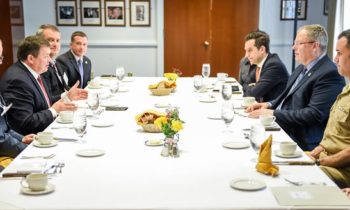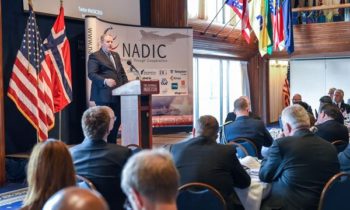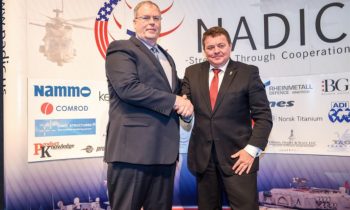
Deputy Defense Secretary Bob Work meets with his Norwegian counterpart at the fourth Annual Norwegian-American Defense Conference at the National Press Club in Washington, D.C., May 19, 2016. DoD photo by Army Sgt. 1st Class Clydell Kinchen
The global security landscape is changing, with a “revanchist” and “resurgent” Russia posing a major concern, Deputy Defense Secretary Bob Work said here today.
Work spoke at the Norwegian-American Defense Conference at the National Press Club, where he hailed Norway’s commitment to global peace and security.
The bonds between the United States and Norway are “unbreakable,” Work said, and he thanked Norwegian counterpart, State Secretary for Defense Øystein Bø, for the invitation.
In addition to Russia, Work outlined concerns about Chinese actions in the South China Sea, North Korea’s pursuit of nuclear weapons, Iranian “malign influence” throughout the Gulf region, terrorism and the Islamic State of Iraq and the Levant.
360-Degree Challenges for Europe
Europe and, by extension, NATO, faces challenges from 360 degrees, the deputy secretary said. To the east, west and north, it faces a “resurgent and apparently antagonistic Russia,” while from the south and from within, terrorism and violent extremism are concerns.
Migration along Europe’s southern flank is a daunting challenge caused by terrorism and violent extremism, he said.
“We feel that we are at a strategic inflection point in the strategic landscape,” Work told the forum. “The next 25 years in the international security environment is going to be much, much different than the last 25.”
‘Steadfast Partner’ in Norway

Deputy Defense Secretary Bob Work makes keynote remarks at the Norwegian-American Defense Industry/Homeland Security Council’s 4th annual Norwegian-American Defense Conference at the National Press Club in Washington, D.C., May 19, 2016. DoD photo by Army Sgt. 1st Class Clydell Kinchen
Norway is a “steadfast partner” to the United States, Work said, noting it stood with the U.S. after the attacks of Sept. 11, 2001. Norwegian troops served with U.S. forces in Afghanistan, he said, and the Nordic nation is part of the coalition against ISIL.
He applauded Norway’s recent decision to send 60 additional personnel to augment the 120 who are already in the fight, and to send a medical team to northern Iraq. That medical team will be especially important, Work said, as forces push toward Mosul.
The 60 additional personnel are predominantly special operations forces who are going to help train vetted Syrian Arab Sunni fighters, Work said.
The secretary highlighted the strong ties between the nations. He noted he visited Norway last year, and President Barack Obama hosted Nordic leaders last week at a summit in Washington. The Marine Corps also has a pre-positioning program in Norway, he pointed out.
‘Revanchist’ Russia Seeking Path of Aggression

Deputy Defense Secretary Bob Work poses for a photo with his Norwegian counterpart at the Norwegian-American Defense Industry/Homeland Security Council’s fourth annual Norwegian-American Defense Conference at the National Press Club in Washington, D.C., May 19, 2016. DoD photo by Army Sgt. 1st Class Clydell Kinchen
A “revanchist and a resurgent Russia” is “pursuing a path of confrontation, aggression and coercion,” Work said.
In 2012, the United States thought it was on a “path to partnership” with Russia, and reduced its last two heavy brigades from Europe, he said. The U.S. “believed and wanted to have a productive partnership with Russia into the future,” Work added.
However, Russia in March 2014 illegally annexed Crimea and started to destabilize eastern Ukraine, he said. Russia has engaged in “nuclear saber rattling,” Work said, adding that it has made threats against NATO allies, most recently Romania and Poland for hosting ballistic missile defense sites.
By 2017, the United States will have a full military division back in Europe, Work said. The United States, he said, is “exercising muscles” it hasn’t used since the Cold War.
He said the United States felt it was important to be a deterrent and reassure its European allies it would be there to respond to Russia if needed.
“Even as we pursue the defeat of ISIL, and other violent extremist groups, we must also vigorously respond to the challenge in the east – Russia,” he said.
He pointed out “reckless” behaviors from Russia, including “unsafe and unprofessional maneuvers” by Russian military aircraft and naval vessels.
Maintaining Technological Advantage
Budget pressures have led to a decline in research and development, he said, noting that the center of innovation has shifted to the commercial sector, and competitors have access to these technologies.
The United States needs to stay ahead and must seek to keep pace with the evolving, dynamic commercial sector, he said. He outlined DoD’s “third offset strategy” that highlights the important role of innovation and advanced technology.
Artificial intelligence and autonomy are going to be central to operations, he said.
“Right now, we see artificial intelligence and autonomy affecting all of our lives — and the lives of all of our citizens,” he said. Just as the rifle, telegraph and railroad changed the way wars were fought and changed the character of war, so will artificial intelligence and autonomy, he added.
For more photos of Deputy Defense Secretary Bob Work at the Norwegian-American Defense Conference, visit DepSecDef Flickr.
(DoD News, Defense Media Activity)
